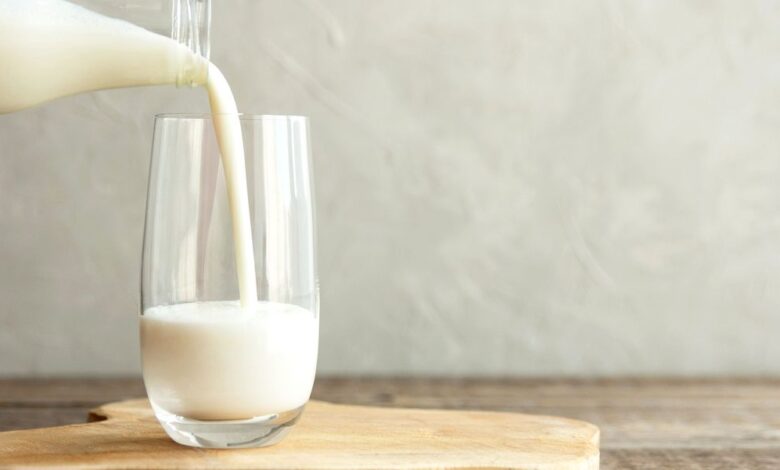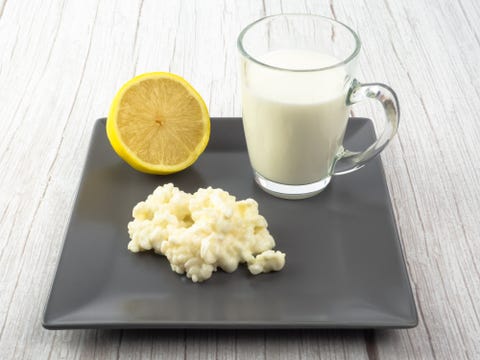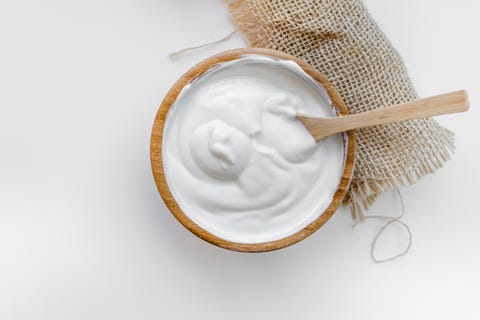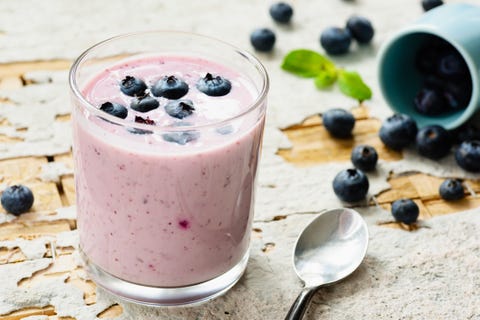What Is Kefir? Nutrition, Health Benefits, How it Compares to Yogurt and More

Although kefir is just gaining traction in the U.S., this probiotic-rich super-drink has been very popular in Europe for decades. Touted for its gut health benefits, this fermented beverage has a consistency between yogurt and milk, and provides a rich source of several vitamins and minerals. Here is everything you need to know about kefir, including how it differs from yogurt and how much to drink daily:
This content is imported from {embed-name}. You may be able to find the same content in another format, or you may be able to find more information, at their web site.
Kefir Nutrition Stats
Serving Size: 1 cup of Lifeway plain low-fat kefir
- 110 calories
- 2 g total fat
- 10 mg cholesterol
- 125 mg sodium
- 12 g total carbohydrate
- 0 g fiber
- 12 g total sugars
- 0 g added sugar
- 11 g protein
- 90 mcg Vitamin A (10% DV)
- 5 mcg Vitamin D (25% DV)
- 390 mg calcium (30% DV)
- 376 mg potassium (8% DV)
What is Kefir?
“Kefir is a fermented milk drink that has been around for over 2,000 years,” says Julie Smolyansky, CEO of Lifeway Foods. Smolyansky’s family has been in the kefir industry for decades and her parents founded Lifeway after their family emigrated from the former Soviet Union. “In ancient times, kefir was a highly sought-after superfood – Marco Polo wrote about it and Cleopatra bathed in it.”
Known for its tart and tangy flavor, kefir has a thin consistency and can be enjoyed on its own or in smoothies and other recipes. Since it is a fermented beverage, it is a rich source of probiotics and other important nutrients. Kefir can be prepared from different types of milk, including cow, sheep and goat, and can be made at home or purchased ready-made at most supermarkets in the dairy department.
Kefir Health Benefits
Registered Dietitian Caroline Margolis says that most individuals can benefit from consuming kefir, including children, pregnant/nursing women and even pets (she advises plain kefir). Some of the many potential health benefits of kefir include:
- A rich source of vitamins and minerals: “One 8 ounce serving of Lifeway Kefir is an excellent source of vitamin D, riboflavin, calcium and phosphorus, and a good source of protein, vitamin A, vitamin B12, potassium and selenium – all nutrients important for every day and immune health,” Margolis shares. “The fermentation process enriches the content of vitamins B1, B12, K, folic acid, calcium and amino acids, and produces health-promoting metabolites, otherwise known as postbiotics.”
- Promotes gut health: “Research continues to support that the integrity of our gut microbiome may be essential for our health,” Margolis says. “Kefir provides diverse probiotics (good bacteria) to help balance the microbiome.” This in turn provides tremendous digestive benefits. A healthy gut is so important since all food is ultimately broken down in the gut so that nutrients can be delivered throughout our bodies. Many individuals with lactose intolerance may also find that they tolerate kefir, as the fermentation process helps to break down lactose.
- Supports immunity: A healthy gut in important for fostering a strong immune system by warding off infectious agents like bacteria and viruses. Kefir, given its probiotic-rich nature, has been shown to support a healthy immune system and even modulate the immune system to suppress viral infections. “Those who are on or finished a course of antibiotics may find that kefir helps digestive upset and help replenish the good bacteria in the gut that may have been wiped out from the medicine,” Margolis adds.
- Combats inflammation: “Studies have shown that those who consume kefir have a decrease in pro-inflammatory cytokines concentrations and an increase in anti-inflammatory cytokine concentrations, which decreases inflammation in our bodies to reduce our risk of disease or disease-related complications,” Margolis explains. “The postbiotic peptides in kefir that are produced during fermentation are being studied for their antihypertensive, anti-inflammatory and anti-oxidative properties, affecting everything from cardiovascular health to diabetes to autoimmune disease prevention.”
- Promotes bone health: Kefir is naturally an excellent source of calcium, a key nutrient to support healthy bones. Some kefir brands are also fortified with vitamin D for even more bone health benefits.
- May improve mood: “There have been studies linking kefir to an increase in serotonin levels and decrease in the risk for anxiety and depression,” Margolis says. “That’s because 90% of serotonin, along with other neurotransmitters, is produced in our gut and sent back to the brain via the vagus nerve – communication known as the gut-brain axis.” She adds that kefir also contains tryptophan, an amino acid that serves as precursor to serotonin, helping to raise serotonin levels in the brain (via our circulatory pathway).
- Promotes glycemic control: Research conducted with 60 diabetic patients found that those supplemented with kefir presented lower values of fasting glucose than those supplemented with another fermented drink. Whole milk kefir was also shown to reduce insulin resistance in an animal study.
- May have anticancer activity: Several studies have suggested that kefir has potential anti-tumor properties against breast cancer, colorectal cancer, and malignant T lymphocytes. But those in active cancer treatment or with suppressed immune systems should speak with their physician first prior to consuming kefir.
Kefir vs. Yogurt vs. Probiotics
Known as “the champagne of dairy,” kefir has double or triple the amount of probiotic strains that you would find in most yogurt. “Kefir is a cultured probiotic beverage that is similar to drinkable yogurt in taste and texture, but that is where the similarity ends,” says Margolis.
She adds that kefir is made with 12 live and active probiotic cultures with a longer fermentation process which results in 25 to 30 billion beneficial CFU (Colony Forming Units) per 8 oz serving. “It results in a more diverse culture than yogurt with two to three times more probiotics and a mix of both bacteria and yeast-based cultures, which is unique to kefir.”
Margolis says that the probiotic activity is what produces kefir’s signature fizz and the increased lactic acid, one of the byproducts of fermentation, and gives kefir its distinct taste and bit. “Nutrition-wise, kefir is higher in protein when compared to non-Greek yogurt,” Margolis says. “Kefir is also an excellent source of vitamin D, when many yogurts are not a source.”
When it comes to kefir versus probiotics supplements, food always comes first. “One benefit is that the dairy buffers the probiotics from the stomach acid, allowing them to make their way through the digestive track and get to work,” Margolis says. Plus, consuming probiotics in whole food form, such as with kefir or yogurt, comes along with a complete package of essential vitamins and minerals as well.
How much kefir should I consume?
“It’s recommended to consume one to two 8-ounce servings of kefir each day for maximum probiotic health,” Margolis says. Keep in mind that one 8-ounce serving of kefir counts as one serving of dairy.
Plain kefir is always best, but if you prefer a flavored variety try to look for ones with limited amounts of added sugar (aim for 10 grams of added sugar or less per 1 cup serving).
You’ll also want to look for kefir varieties where the label says live and active cultures, and that it contains multiple strains for a high colony forming units (CFU) count, Margolis recommends.
Disadvantages of Kefir
This nutrient-rich probiotic food doesn’t have many disadvantages, but Margolis says that those with compromised immune systems may want to speak with their doctor first prior to consuming kefir as it contains live and active cultures. “Because kefir is not meant to treat medical conditions, we advise consulting with your medical professional or registered dietitian regarding any health concerns, your diet and specific medical conditions.”
Individuals with a milk protein allergy or those that have been advised by a doctor to avoid probiotics for medical reasons should avoid consuming kefir too.
Unique Ways to Use Kefir
Kefir can be enjoyed straight from the bottle, added to smoothies and more for a nutrient-rich probiotic boost. It can also add flavor and texture to warm dishes and make baked goods extra fluffy, but Margolis shares that much of the probiotic bacteria won’t survive being cooked. Some other ways that Margolis recommends using kefir include:
- Use your favorite flavor of kefir as the base for any smoothie or smoothie bowl recipe.
- Use kefir to makeover your breakfast by spicing up a bowl of cereal or granola, or mix it into pancake or waffle batter.
- Power up your overnight oats or chia seed pudding by using kefir.
- Choose plain kefir over mayo or sour cream to cut calories and fat, without sacrificing flavor in your favorite dips and dressings.
- Add a tangy and flavorful zip to soups, hummus, snacks and spreads using your favorite flavor of kefir.
- Use kefir as a base for your next protein marinade. Not only does kefir’s tangy flavor work well with herbs and spices to impart a fresh flavor, the lactic acid (in kefir) and the live and active probiotic cultures turn tough cuts into tender, juicy masterpieces.
- Give your desserts a probiotic boost with your favorite flavor of kefir. It serves as a great base for puddings, popsicles, ice cream, frostings and more.
This content is created and maintained by a third party, and imported onto this page to help users provide their email addresses. You may be able to find more information about this and similar content at piano.io
Source link





